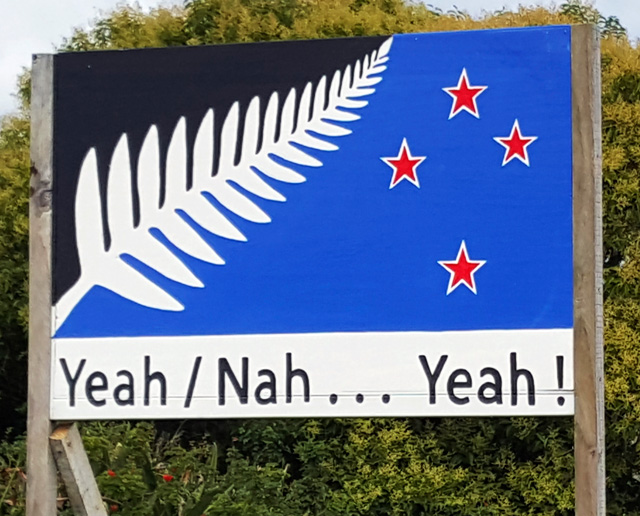|
The flag debate enters its final phase badly skewed by factors that have little to do with our national symbol. NZ Listener 3 March 2016 The flag debate on the streets of West Auckland.
The flag debate enters its final phase badly skewed by factors that have little to do with our national symbol. To the many voters who oppose change because they like the present flag or dislike the alternative, we can add those wanting to use the referendum for a purely political point. And yet it’s not too late to get the debate back on track. The Listener stands by the simple question it posed two years ago: does New Zealand have a clear sense of its own national identity or are we still so unsure of ourselves that we must present an image to the world of being a distant appendage of a former colonial power? It’s helpful to look at this in an historical context. A booklet just published by the Flag Consideration Panel reminds us that when the current flag with its Union Jack was adopted, New Zealand troops were fighting for the British Empire in South Africa. And they wore the silver fern. Even then there was recognition of the fern’s cherished role in New Zealand. As Sir Tipene O’Regan of Ngai Tahu has said, “Maori have always honoured the fern, giving it a pride of place.” To Maori, the silver fern denotes “strength, stubborn resistance and enduring power”. However, at that time, most New Zealand citizens had been born in the United Kingdom or were the offspring of people born in the UK. Until 1949, New Zealanders carried British passports. As recently as 1973, we were officially described as British subjects. God Save the Queen remained our official anthem until 1977. For New Zealanders not born then, the strength of the attachment to Britain must seem extraordinary. That umbilical cord was severed when Britain joined the European Economic Community in 1973. What alarmed us then as a frightening abandonment turned out instead to be a momentous act of liberation, setting New Zealand free from its stifling dependence on Britain. By the 70s, most other former British colonies had already dropped the Union Jack from their flags. Prominent voices here spoke out for change – including that of union leader Ken Douglas, who suggested in 1969 that we adopt the silver fern and Southern Cross. Earlier still, Labour leader Norman Kirk, whose tenure as prime minister would be defined by a determination that New Zealand should make its own way in the world, had called for a change of flag to distinguish ours from Australia’ In the decades since, the case for a new flag has become more compelling. From being a stolidly Anglo-Saxon outpost, Auckland is now the world’s fourth-most ethnically diverse city. We have forged close relationships with other countries, most notably in Asia and the Pacific. Our relationship with London remains close and affectionate, but it no longer defines us. Our flag has yet to catch up with this remarkable national metamorphosis. In this one vital symbolic respect, we remain locked in the rusted embrace of an extinct empire. The old flag fails miserably to reflect our status as a dynamic, independent, multicultural society in the South Pacific, proud of our Maori heritage. Regrettably, much of the recent focus has been on the referenda cost – although it’s less, it transpires, than the annual taxpayer contribution in services to gang members. And amid all the talk of “tea-towel design”, we forget not all Canadians wanted a change of flag in 1964, still less the maple leaf, which did feature on tea towels. It took a determined Prime Minister, Lester Pearson, to drive change. Canada’s now beloved flag features a stylised leaf with 11 points – of no special significance. The number was chosen after wind tunnel tests showed the design “to be the least blurry”. Yet how many Canadians today would argue that Canadian pride and identity hasn’t been greatly enhanced by one of the world’s most recognisable flags? New Zealand has shown that it can be bold. This is the country that gave women the vote in 1893, took a principled stand against nuclear weapons in the 1980s and has won admiration time and again for its independence and fair-mindedness on the international stage. What a lost opportunity it would be for this nation if the political noise surrounding the current referendum deters us from what is so obviously the right decision. http://www.listener.co.nz/commentary/features/flag-of-the-bold/
1 Comment
Colin Thomas
8/3/2016 12:58:43 pm
initially I thought, what a waste of money!
Reply
Your comment will be posted after it is approved.
Leave a Reply. |
MEDIAArchives
December 2022
Categories
All
|


 RSS Feed
RSS Feed
